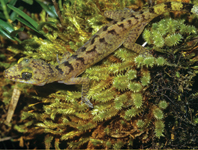Abstract
We describe a new species of bent-toed gecko in the genus Cyrtodactylus from hill forest in Southern Highlands Province, Papua New Guinea. Cyrtodactylus manos sp. nov. can be distinguished from all congeners in New Guinea by its small size in combination with aspects of colouration and body and tail scalation. The new species adds to the growing number of vertebrate species known only from karstic mountains along the southern edge of New Guinea’s Central Cordillera, suggesting that this region holds previously overlooked endemic karst-associated biota.
References
Baker, N. (2016) Three records of Cyrtodactylus sp. from ‘Bilip’, Gulf Province, Papua New Guinea. Southeast Asia Vertebrate Records, 2016, 91–94.
Gamble, T. (2014) Collecting and Preserving Genetic Material for Herpetological Research. Society for the Study of Amphibian and Reptiles, Salt Lake City, 56 pp.
Grismer, L.L. & Grismer, J.L. (2017) A re-evaluation of the phylogenetic relationships of the Cyrtodactylus condorensis group (Squamata; Gekkonidae) and a suggested protocol for the characterization of rock-dwelling ecomorphology in Cyrtodactylus. Zootaxa, 4300 (4), 486–504.
https://doi.org/10.11646/zootaxa.4300.4.2
Grismer, L.L., Wood, P.L., Thura, M.K., Zin, T., Quah, E.S., Murdoch, M.L., Grismer, M.S., Aung, L., Kyaw, H. & Lwin, N. (2017) Twelve new species of Cyrtodactylus Gray (Squamata: Gekkonidae) from isolated limestone habitats in east-central and southern Myanmar demonstrate high localized diversity and unprecedented microendemism. Zoological Journal of the Linnean Society, 182 (4), 862–959.
https://doi.org/10.1093/zoolinnean/zlx057
Günther, R., Richards, S.J. & Dahl, C.S. (2014) Nine new species of microhylid frogs from the Müller Range in western Papua New Guinea (Anura, Microhylidae). Vertebrate Zoology, 64 (1), 59–94.
Iannella, A., Richards, S. & Oliver, P. (2014) A new species of Choerophryne (Anura, Microhylidae) from the central cordillera of Papua New Guinea. Zootaxa, 3753 (5), 483–493.
https://doi.org/10.11646/zootaxa.3754.5.6
Kraus, F. (2008) Taxonomic partitioning of Cyrtodactylus louisiadensis (Lacertilia: Gekkonidae) from Papua New Guinea. Zootaxa, 1883 (1), 1–27.
https://doi.org/10.11646/zootaxa.1883.1.1
McAlpine, J.R., Keig, G. and Falls, R. (1983) Climate of Papua New Guinea. Commonwealth Scientific and Industrial Research Organization in association with Australian National University Press, Canberra, 200 pp.
Mecke, S., Kieckbucsh, M., Hartmann, L. & Kaiser, H. (2016) Historical considerations and comments on the type series of Cyrtodactylus marmoratus Gray, 1831, with an updated comparative table for the bent-toed geckos of the Sunda Islands and Sulawesi. Zootaxa, 4175 (4), 353–365.
https://doi.org/10.11646/zootaxa.4175.4.5
Meiri, S., Bauer, A.M., Allison, A., Castro-Herrera, F., Chirio, L., Colli, G., Das, I., Doan, T.M., Glaw, F., Grismer, L.L., Hoogmoed, M., Kraus, F., LeBreton, M., Meirte, D., Nagy, Z.T., Nogueira, C.D.C., Oliver, P., Pauwels, O.S.G., Pincheira-Donoso, D., Shea, G., Sindaco, R., Tallowin, O.J.S., Torres-Carvajal, O., Trape, J.-F., Uetz, P., Wagner, P., Wang, Y., Ziegler, T. & Roll, U. (2018) Extinct, obscure or imaginary: The lizard species with the smallest ranges. Diversity and Distributions, 24 (2), 262–273.
https://doi.org/10.1111/ddi.12678
Nielsen, S.V. & Oliver, P.M. (2017) Morphological and genetic evidence for a new karst specialist lizard from New Guinea (Cyrtodactylus: Gekkonidae). Royal Society Open Science, 4 (11), 170781.
https://doi.org/10.1098/rsos.170781
Oliver, P.M. & Richards, S.J. (2012) A new species of small bent-toed gecko (Cyrtodactylus: Gekkonidae) from the Huon Peninsula, Papua New Guinea. Journal of Herpetology, 46 (4), 488–493.
https://doi.org/10.1670/11-101
Oliver, P., Krey, K., Mumpuni & Richards, S. (2011) A new species of bent-toed gecko (Cyrtodactylus, Gekkonidae) from the North Papuan Mountains. Zootaxa, 2930 (1), 22–32.
https://doi.org/10.11646/zootaxa.2930.1.2
Oliver, P.M., Laver, R.J., De Mello Martins, F., Pratt, R.C., Hunjan, S. & Moritz, C.C. (2017) A novel hotspot of vertebrate endemism and an evolutionary refugium in tropical Australia. Diversity and Distributions, 23 (1), 53–66.
https://doi.org/10.1111/ddi.12506
Oliver, P.M., Richards, S.J. & Donnellan, S.C. (2019) Two new species of treefrog (Pelodrydidae: Litoria) from southern New Guinea elucidated by DNA barcoding. Zootaxa, 4609 (3), 469–484.
https://doi.org/10.11646/zootaxa.4609.3.4
Oliver, P., Richards, S., Mumpuni, M. & Rösler, H. (2016) The Knight and the King: two new species of giant bent-toed gecko (Cyrtodactylus, Gekkonidae, Squamata) from northern New Guinea, with comments on endemism in the North Papuan Mountains, ZooKeys, 562, 105–130.
https://doi.org/10.3897/zookeys.562.6052
Oliver, P.M., Richards, S.J. & Sistrom, M. (2012a) Phylogeny and systematics of Melanesia’s most diverse gecko lineage (Cyrtodactylus, Gekkonidae, Squamata). Zoologica Scripta, 41 (5), 437–454.
https://doi.org/10.1111/j.1463-6409.2012.00545.x
Oliver, P., Richards, S. & Tjaturadi, B. (2012b) Two new species of Callulops (Anura: Microhylidae) from montane forests in New Guinea. Zootaxa, 3178 (1), 33–44.
https://doi.org/10.11646/zootaxa.3178.1.3
Oliver, P.M., Skipwith, P. & Lee, M.S.Y. (2014) Crossing the line: increasing body size in a trans-Wallacean lizard radiation. Biology Letters, 10 (10), 20140479.
https://doi.org/10.1098/rsbl.2014.0479
Oliver, P.M., Sistrom, M., Tjaturadi, B., Krey, K. & Richards, S.J. (2010). On the status and relationships of the gecko species Gehyra barea Kopstein 1926 with description of new specimens and a range extension. Zootaxa, 2354 (1), 45–55.
https://doi.org/10.11646/zootaxa.2354.1.4
Oliver, P., Tjaturadi, B., Mumpuni, Krey, K. & Richards, S. (2008) A new species of large Cyrtodactylus (Squamata: Gekkonidae) from Melanesia. Zootaxa, 1894, 59–68.
https://doi.org/10.11646/zootaxa.1894.1.5
Richards, S.J. (2018) Identification Guide to Flora and Fauna of Hides Ridge and the Agogo Range (Moro), Papua New Guinea. ExxonMobil PNG Limited, Port Moresby, 166 pp.
Richards, S.J. & Günther, R. (2019) Three new scansorial species of microhyllid frogs (Anura: Cophixalus, Oreophryne). Salamandra, 55 (2), 55–72.
Richards, S.J. & Oliver, P.M. (2010) A New Scansorial Species of Cophixalus (Anura: Microhylidae) from the Kikori River Basin, Papua New Guinea. Journal of Herpetology, 44 (4), 555–563.
https://doi.org/10.1670/09-044.1
Rösler, H., Richards, S.J. & Günther, R. (2007) Remarks on the morphology and taxonomy of geckos of the genus Cyrtodacylus, Gray, 1827, occuring east of Wallacea, with descriptions of two new species (Reptilia: Sauria: Gekkonidae). Salamandra, 43 (4), 193–230.
Tallowin, O.J.S., Tamar, K., Meiri, S., Allison, A., Kraus, F., Richards, S.J. & Oliver, P.M. (2018) Early insularity and subsequent mountain uplift were complementary drivers of diversification in a Melanesian lizard radiation (Gekkonidae: Cyrtodactylus). Molecular Phylogenetics and Evolution, 125, 29–39.

